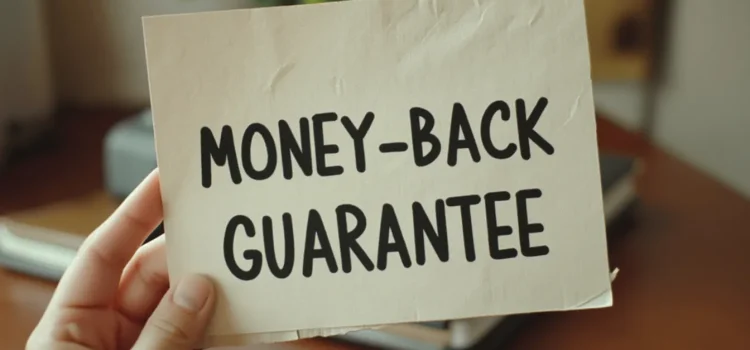

This article is an excerpt from the Shortform book guide to "$100M Offers" by Alex Hormozi. Shortform has the world's best summaries and analyses of books you should be reading.
Like this article? Sign up for a free trial here.
What makes a guarantee powerful enough to boost sales? Why do some businesses hesitate to offer strong guarantees despite their effectiveness?
According to Alex Hormozi, guarantees demonstrate that you have confidence in your product—and that confidence is contagious. Understanding the right type of guarantee for your business can make the difference between mediocre and exceptional results.
Read more to explore how implementing the right guarantee can align your interests with your customers’ success while protecting your bottom line.
Alex Hormozi on Guarantees
According to Alex Hormozi, guarantees increase the psychological appeal of your offer. By offering a guarantee, you’re shifting risk from the customer to yourself, which can lower their resistance to making the purchase. It also demonstrates your confidence in your product: It’s a way of saying, “We believe in our product so much, we’re willing to back it up.” This level of confidence can be infectious and drive more customers to commit to a purchase.
Guarantees should be clear about the conditions, including the time frame and the form of compensation, such as a full refund, partial credit, or an extended period of free service if the initial offering doesn’t meet their needs. Hormozi further explains that there are several variations of guarantees you can offer, including the following:
Unconditional Guarantees: These provide a straightforward promise, like satisfaction or your money back within a specific period.
Conditional Guarantees: These depend on the customer meeting certain criteria or actions. For example, you might only offer a refund if a client isn’t satisfied after attending all the sessions in the program you offer.
Outcome-Based Guarantees: These are tied to the customer achieving some result from your product. For example, you might provide consulting services and instead of charging upfront, take a commission once the customer achieves the desired outcome, like landing new clients.
| Guarantees Put Your Skin in the Game Guarantees like Hormozi describes here can be seen as a practical application of Skin in the Game, as popularized by risk analyst Nassim Nicholas Taleb. By offering such guarantees, you are effectively putting yourself on the line, and thereby aligning your interests more closely with those of your customers. This self-imposed risk creates a powerful incentive to ensure the quality of your products and services, as any failure to meet customer expectations could result in financial losses for you through refunds or repairs. This alignment of interests exemplifies Taleb’s principle that decision-makers should have personal stakes in the outcomes of their choices. In this case, while you should profit if your products are good, Taleb would argue that you should also face consequences if your products are not of good quality. Having “skin in the game” in this way motivates you to be more diligent in your quality control, customer service, and overall product development, ultimately leading to better outcomes for both your business and your customers. |

———End of Preview———
Like what you just read? Read the rest of the world's best book summary and analysis of Alex Hormozi's "$100M Offers" at Shortform.
Here's what you'll find in our full $100M Offers summary:
- How to show customers you have an offer they can’t refuse
- Tips for setting high, yet fair prices for your products
- The one thing that both small and big businesses have in common






